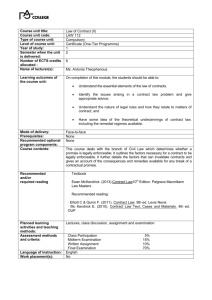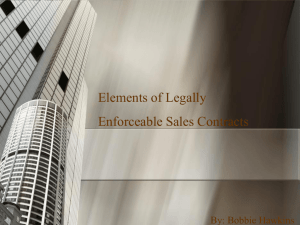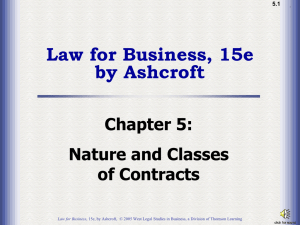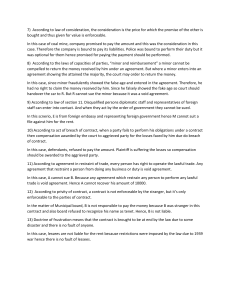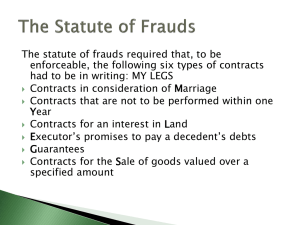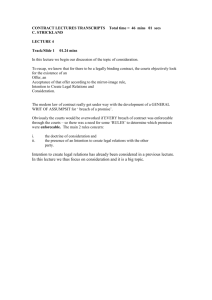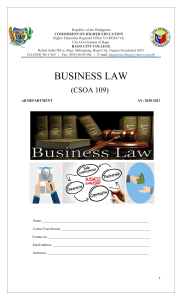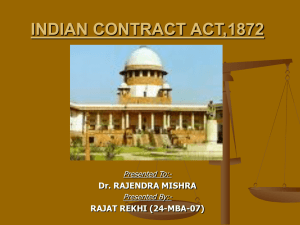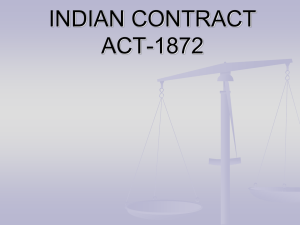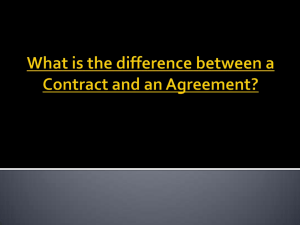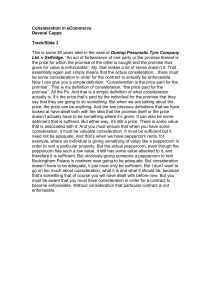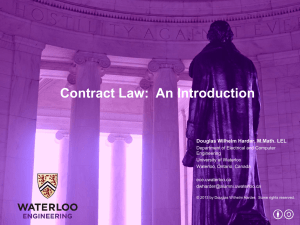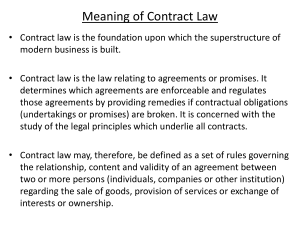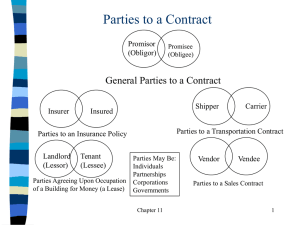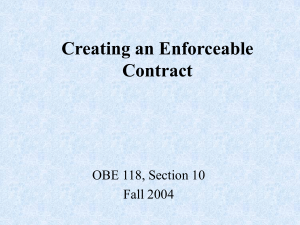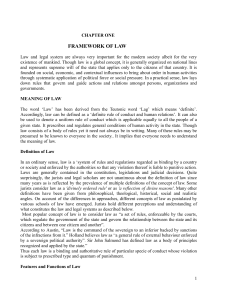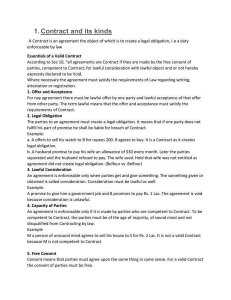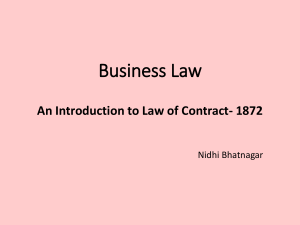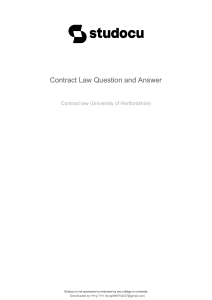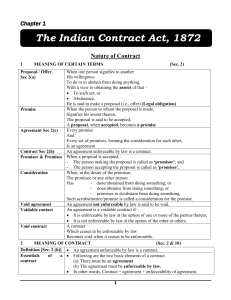LAWS 506 - CONTRACTS
advertisement
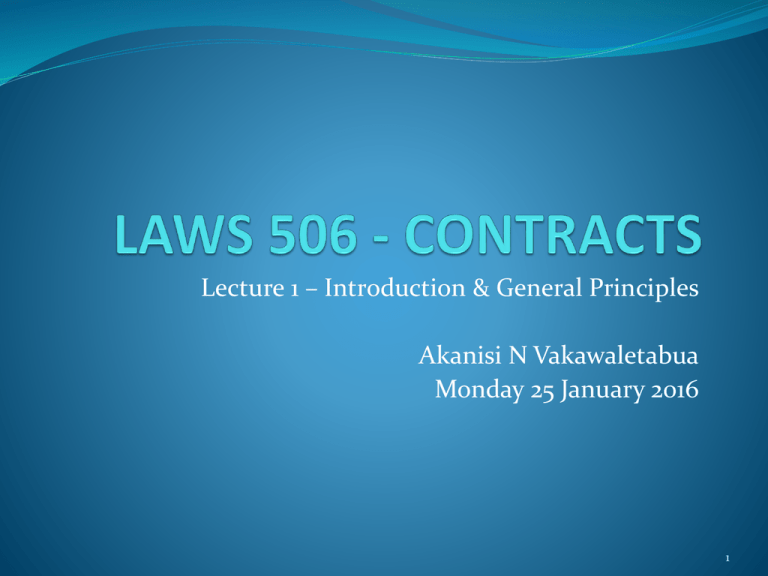
Lecture 1 – Introduction & General Principles Akanisi N Vakawaletabua Monday 25 January 2016 1 Overview Introduction Course Topics Intro & Expectations Lectures & Tutorials Assessments Reading Material Break Introducing General Principles 2 Course Topics 1. 2. 3. 4. 5. 6. Introduction & General Principles Offer and Acceptance Consideration Formative Req’ments: Intention, Certainty and Completeness Terms of the Contract (TOC) Regulation of the TOC 3 Introduction & Expectations Unit Descriptors – on MOODLE next week. Achieving Learning Outcomes Reading Material Critical Thinking /Analysis Participating Law in Context (Application) Integrity (Currency) Being on Time Hard Work Remember I only provide you with learning tools it is up to you to use it to your advantage. 4 Introduction & Expectations Question Time Real Life Application of Theory Contracts requires a lot of practical examples Respect Yourselves, Each Other and this Learning Space Guest Speaker(s) 5 Lectures & Tutorials Attendance will be taken at both If you cannot make it please email me or tell me in person Ideally Lecture notes and Tutorial Problems will be on Moodle the week of or before. More group work and participation required in Tutorials so come prepared. Great basis to form study groups during this course 6 Consultation Hours Rm 2 – H204 12-2pm Thursdays Email: akanisi411@gmail.com Drop-in sessions: 2 hours (Contracts) TBC 7 Assessments Assignment 1 (Due Week 7) Assignment 2 (Due Week 12) Test 1 (Week 6) Test 2 (Week 11) Final Exam 15% 15% 15% 15% 60% 40% 8 Reading Material Most of the textbooks for this course are available in the library for your reading. Otherwise the INTERNET is your best alternative to: Understanding basic concepts Looking up cases Other Research Whilst using the INTERNET/Textbook ensure that: Source of Information is trusted ALWAYS CITE YOUR SOURCES 9 Remember Yourself! 10 What is a Contract? The essentials are the rights, duties and liabilities that arise from the promise or promises made by the parties. Key elements are: A Promise or promises Promise(s) to be between two or more legally capable people (Parties) Promise(s) to create an obligation Obligation to be enforceable at law. 11 What do Courts look at? Courts look at the formation, performance, continuance, and discharge of the parties’ individually created obligations. Therefore: Applies the law of contract to see whether the agreement is legally valid and enforceable. If the Court decides that it is a valid contract then it interprets the words to determine the nature and extent of what parties have agreed to. How does Contract Law differ from other areas of law? 12 Void, Voidable and Enforceable Contracts a) Void Contracts: void ab initio void from the beginning due to missing element. Parties would be in the same position as if the contract had never been made. b) Voidable Contracts: where one of the parties to the contract has an 0ption to continue to cancel the contract because of some vitiating factor such as duress or undue influence. c) Unenforceable Contracts: is one recognised by law. It is valid but due to technical defect one or both parties cannot be sued on it. Eg: Some oral contracts. 13 Elements of a Contract To be a contract (enforceable by law) the arrangement between parties must exhibit certain key elements. Without those elements, the agreement is not a contract and the courts cannot enforcement. These elements are as follows: Offer Acceptance Consideration Intention to be bound Capacity Reality of Consent; and Legality 14 Elements of a Contract In combining the seven elements it would read as follows: “An offer and acceptance taken together form the agreement to be given legal force. In simple contracts that agreement must be supported by consideration to establish the obligation; the parties must have the intention to be bound. The parties must voluntarily enter the contract (reality of consent) and have the legal capacity to reach a binding agreement and the subjectmatter of agreement must be legal” - If the above 7 elements are present, the agreement will be a contract that will be legally enforced. 15 Problem A and B negotiated the sale and purchase of B’s house in Sigatoka. They reach an agreement. A has second thoughts and refuses to sign. A week later B writes to A saying: “I understand that you do not wish to proceed with our agreement. To resolve matters quickly, I am prepared to proceed on the same basis but will accept $1000 less. If you wish to go ahead, please let me have your cheque for the deposit.” A replies: “I am prepared to proceed on the basis outlined in your letter. My cheque for the deposit is enclosed. ” Is there an enforceable contract against either A or B? 16
